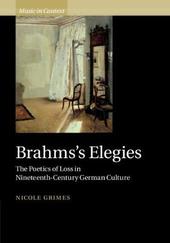
|
Brahms's Elegies: The Poetics of Loss in Nineteenth-Century German Culture
Hardback
Main Details
Description
Nicole Grimes provides a compellingly fresh perspective on a series of Brahms's elegiac works by bringing together the disciplines of historical musicology, German studies, and cultural history. Her exploration of the expressive potential of Schicksalslied, Nanie, Gesang der Parzen, and the Vier ernste Gesange reveals the philosophical weight of this music. She considers the German tradition of the poetics of loss that extends from the late-eighteenth-century texts by Hoelderlin, Schiller and Goethe set by Brahms, and includes other philosophical and poetic works present in his library, to the mid-twentieth-century aesthetics of Adorno, who was preoccupied as much by Brahms as by their shared literary heritage. Her multifaceted focus on endings - the end of tonality, the end of the nineteenth century, and themes of loss in the music - illuminates our understanding of Brahms and lateness, and the place of Brahms in the fabric of modernist culture.
Author Biography
Nicole Grimes is Assistant Professor of Music at the University of California, Irvine. She serves on the Editorial Board of Music Analysis and is a member of the Board of Directors of the American Brahms Society. Previous works include Mendelssohn Perspectives (2012) and Rethinking Hanslick: Music, Formalism, and Expression (2013).
ReviewsAdvance praise: 'Deftly weaving musical commentary into an elegant exploration of the broader cultural fabric of late nineteenth-century Germany, Grimes demonstrates how some of Brahms's greatest but least understood vocal compositions intersected with the intellectual, literary, and philosophical currents of his time. This compelling study represents contextual musicology at its best.' Walter Frisch, Columbia University 'In Brahms's Elegies: The Poetics of Loss in Nineteenth-Century German Culture, a bold and imaginative book, Nicole Grimes takes the idea of Brahms's obsession with mortality and probes it from new and, at times, unexpected angles. The volume reveals an author who reads unusually widely and who uses her learning to challenge well-established interpretations ... Brahms's Elegies is built on strong foundations, and one comes away from it educated, challenged and, , Martin Ennis, Musicological Austriaca 'a disciplined and imaginative piece of scholarship which thematically draws together a selection of Brahms's elegiac works using an interdisciplinary analytical framework. Grimes investigates the deep relationship between the musical works and their contemporaneous worlds in literature, visual art, and philosophy. This book examines a relatively unknown collection of works within Brahms's catalogue, both from musical/analytical and literary perspectives. The focus and breadth are notable in this regard, and the author's examination of Brahms's own literary proclivities and knowledge are particularly significant.' Society for Musicology in Ireland
|